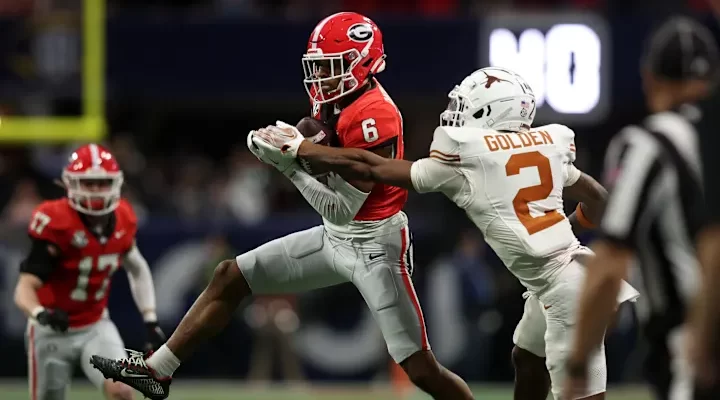BREAKING: Dominic Lovett’s Draft Position Signals Special Teams Role—Can He Carve Out NFL Success Despite Being Picked 244th Overall?
In the high-stakes world of the NFL Draft, every pick tells a story. For Dominic Lovett, being selected 244th overall may not come with the fanfare of a first-round star, but it’s far from the end of the road. In fact, his draft position shines a spotlight on a reality many late-round picks face—a need to prove value in creative ways, often by carving out a niche on special teams. Lovett’s journey from college standout to NFL hopeful will likely hinge on his versatility, grit, and willingness to embrace roles beyond just his primary position.
Late-round draft picks like Lovett often arrive with the weight of expectations balanced by the opportunity to become surprise contributors. While the 244th overall pick suggests he wasn’t among the most coveted players on draft day, it also reflects the league’s appreciation for his potential upside—especially if he can demonstrate value on special teams and in situational plays. History shows that some of the NFL’s most impactful players have emerged from the shadows of late draft rounds, thriving on special teams before evolving into multi-dimensional contributors.
Lovett’s skill set and background hint at this trajectory. Known for his explosive speed, reliable hands, and football IQ, he played a key role in college offenses that relied on versatility and quick adaptation. However, the jump from college to the NFL demands not only talent but also adaptability, especially for those drafted late. Special teams, often the overlooked third phase of the game, offers a proving ground where players like Lovett can showcase their physicality, hustle, and commitment.
Special teams excellence can fast-track a player’s career. Coaches value players who can contribute consistently in kickoff coverage, punt returns, blocking, and tackling. For Lovett, excelling here could be the difference between spending weeks on the practice squad or carving out a steady role on the 53-man roster. His ability to adjust to the fast pace and physical demands of special teams units will be critical in earning and maintaining a spot on the team.
Beyond physical ability, special teams demand mental toughness and football savvy. Players must quickly process plays, anticipate opponents’ moves, and maintain discipline in high-pressure, chaotic moments. Lovett’s college tape reveals a player who studies the game carefully and reacts instinctively—traits that can translate well into special teams assignments where split-second decisions define success or failure.
Moreover, Lovett’s work ethic and willingness to contribute wherever needed will be scrutinized closely during training camp and preseason. Coaches want players who put the team first, embrace their role without ego, and consistently bring energy and focus. The veteran presence on many NFL teams often emphasizes that special teams standouts become locker room leaders and culture setters. Lovett’s attitude and leadership qualities will be as important as his athletic skills.
Of course, the goal remains to contribute as a primary offensive weapon—whether as a wide receiver, slot target, or return specialist. But the reality is that many late-round picks must initially prove themselves on special teams before earning meaningful snaps on offense or defense. Lovett’s ability to impress during these early opportunities will shape his trajectory.
In addition to on-field duties, Lovett’s transition includes adapting to the complexity of NFL playbooks, the speed of professional practices, and the rigors of a longer season. Mastery of the playbook and trust from the coaching staff will be vital to getting chances beyond special teams. Players who can quickly absorb schemes and execute with precision increase their chances of earning snaps in the offense.
His draft position also reflects the challenges Lovett faces competing against established veterans and higher-round rookies for limited roster spots. The NFL is fiercely competitive, and late-round picks must outperform expectations to stick. That pressure often brings out the best in players who can lean on their special teams contributions to make an immediate impact.
While some may view being picked 244th as a long shot, Lovett’s story is far from unique. Countless NFL stars started their careers as underdogs, carving out legacies from humble beginnings. Players like Matthew Slater of the Patriots and Justin Bethel have built Pro Bowl careers primarily through special teams mastery. These examples highlight that draft position is not destiny—hard work, versatility, and seizing opportunities often matter more.
From a team-building perspective, drafting a player like Lovett late in the draft can be a savvy move. Teams often look for players who bring specific skill sets, a strong competitive drive, and special teams potential in these rounds. For the coaching staff, a player who can contribute in multiple ways provides roster flexibility and depth.
As training camp approaches, Lovett’s focus will be on physical preparation, learning the nuances of special teams coverage units, and proving his value on offense. The preseason games will be a critical showcase, where coaches evaluate not just statistics but effort, attitude, and reliability. Every tackle on kickoff coverage, every contested catch, and every smart decision on the field will add to his case.
Fans and media often overlook special teams, but savvy NFL observers recognize it as the backbone of winning football. Strong special teams play influences field position, creates turnovers, and can be a game-changing factor in close contests. For a player like Lovett, becoming a special teams ace can be the foundation for a lasting NFL career.
Importantly, Lovett’s ability to embrace this role may also inspire younger players and those drafted even later. The NFL landscape is littered with stories of perseverance, and Lovett’s potential rise from 244th overall pick to impact player would reinforce the belief that dedication and adaptability can overcome draft-day rankings.
While the path may be challenging, Lovett’s preparation and mindset appear geared for the journey. His coaches and mentors have praised his willingness to learn, humility, and competitive fire. These intangibles often separate players who merely make a roster from those who thrive.
Looking ahead, success for Lovett may come in stages. Special teams excellence could secure his roster spot, while gradual offensive involvement can lead to bigger roles. Return duties, gadget plays, and situational targets might become stepping stones toward a more prominent place in the offense.
Ultimately, the story of Dominic Lovett and his 244th overall selection is a reminder of the unpredictable nature of the NFL. Draft position gives a starting point, but the real narrative is written on the practice fields, special teams units, and game-day opportunities. For Lovett, the challenge is clear: prove that he can contribute at the highest level, starting with special teams, and build a career from there.
As the season unfolds, keeping an eye on Lovett’s progress will be fascinating. Will he become a special teams stalwart, a reliable offensive weapon, or perhaps both? Only time will tell, but one thing is certain—his journey is just beginning, and the 244th pick is ready to fight for every chance to shine.



